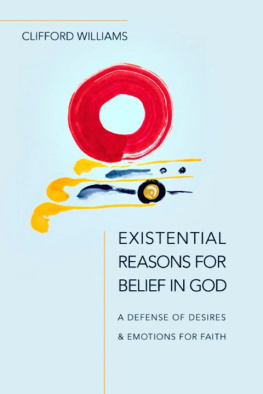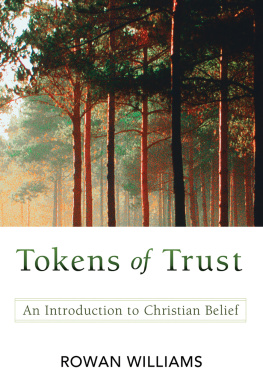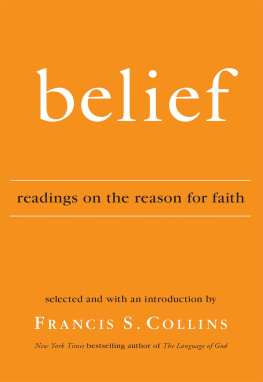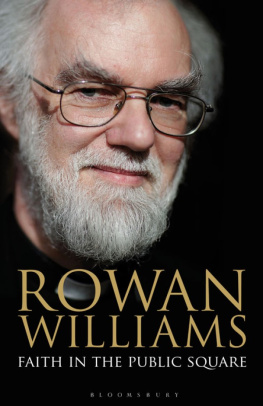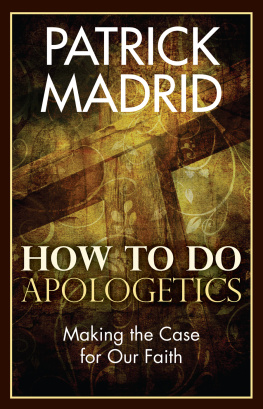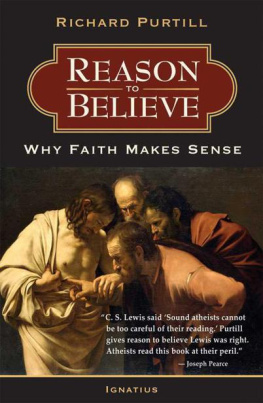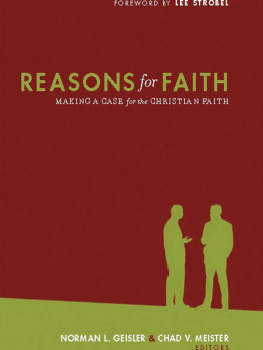






It is not enough to think about our destiny: it must be felt.
-Miguel de Unamuno, Tragic Sense ofLife
CONTENTS
............. 9
Need and Reason
............ 17
..... 29
The Existential Argument Does Not Guarantee Truth
The Existential Argument Justifies Belief in Any Kind of God
Not Everyone Feels Existential Needs
....... 128
Existential Needs Can Be Satisfied Without Faith
............ 150
............. 175
............ 184
................ 187
ACKNOWLEDGMENTS
THIS BOOK BEGAN WITH A CONVERSATION with Rod Taylor during the 2004 Cornerstone Music Festival in Bushnell, Illinois. I was giving talks on Kierkegaard and Nietzsche, and Rod, who at the time was finishing a Ph.D. in English literature at Indiana University, was in the audience. During lunch at his camper, he expressed dissatisfaction with evidential apologetics and wanted someone to explore need-based grounds for believing. He thought I should do it. The book was nudged along by a conversation with Ann Eberhardt, a former student, for whom the traditional evidential arguments for faith did not work. I am grateful to Rod for further conversations, plus Gary Deddo, Scott Erdenberg, Titus Hattan, Kirsten Hildebrand, Christopher McCammon, Ellen Palmer, Letha Dawson Scanzoni, Corey Shenk, Mark Vincent, Linda Williams, several of those whose faith journeys appear in the book, and an anonymous reader for IVP Academic, some for conversations on the topic of the book and some for comments on the manuscript. I also want to thank the people who recounted their faith journeys to me for their honesty and passion. I have changed their names so that they can remain anonymous, but I am indebted to them, both for the part their accounts play in this book and for their personal interactions with me. I also thank Trinity College for granting me a sabbatical to work on the book and Yvana Mols, who replaced me at Trinity College while I was away. I am grateful as well for the opportunity of working in the Bodleian Library at Oxford University while finishing the manuscript.
1
INTRODUCTION
NEED AND REASON
CHRISTIANS HAVE DIFFERING VIEWPOINTS about the role that the satisfaction of needs should play in acquiring and sustaining faith. Some Christians think that the satisfaction of needs should play little or no role. For them, only reason can tell us that faith is legitimate. Satisfying needs has little or nothing to do with the legitimacy of beliefs. The apologetic tradition in both Protestant and Catholic Christianity stresses this standpoint.
Other Christians think that faith should be acquired and sustained through the satisfaction of needs, for otherwise faith would be barren, disconnected from what matters most to us. Many Christians, in fact, have come to faith because it satisfies deep needs. Some of these Christians regard reason as less trustworthy than need, for reason often leads people astray, especially those who are influenced by the secular culture in which we live. It is better to trust one's needs-not just fleeting feelings or wild desires, but emotional and spiritual needs that all humans share.
Christians also differ on whether emotion is a component of faith. The partisans of reason regard faith as consisting primarily or wholly of assent to the truth claims of Christianity. If this were not so, they say, faith would be as shallow and fickle as emotions are. And like emotion, it would be blind and disruptive.
The advocates of emotion, however, view faith-as-assent as lifeless. It contains no vibrancy, no energy or passion. A rich and lively faith cannot consist simply of intellectual assent. It has to have the emotional depth that Christian virtues such as love, joy, peace, patience and kindness possess. How can mere intellectual assent, they ask, have this depth? And why must all emotions be shallow, fickle, blind and disruptive?
These two dichotomies are connected. Those who believe that faith should be acquired through reason are likely to think of faith as excluding emotion. But those who believe that faith should be acquired through satisfaction of need are likely to think of faith as consisting of emotions, for satisfaction of need involves having emotions.
Two questions frame the discussion of these themes: (1) Is it legitimate to acquire faith in God solely through satisfaction of needs? (2) Does faith in God consist of emotions? I answer that the ideal way to acquire faith in God is through both need and reason, and that faith should consist of both emotion and assent.
The answers provided in this study are middle-of-the-road assertions. They steer between rationalists and emotionalists. Rationalists emphasize reason, and emotionalists emphasize emotion and need. I want to emphasize both. My aim is to defend the legitimacy of acquiring faith through need, emotion and reason. Satisfaction of need legitimately draws us to faith, but reason must be involved in this drawing. More simply, the two basic ideas of the book are the drawing power of need and the certifying ability of reason. Need without reason is blind, but reason without need is sterile.
Other claims about the value of existential reasons for faith occur within the context of these themes:
1. Emotion and need can be trusted for faith in God as much as reason.
2. The negative assessment of emotions by some Christians is unjustified.
3. The remedy for being led astray by emotions is not to distrust emotions, but to develop the right emotions.
4. Christians should cultivate emotions as much as they do commitment and right action.
5. Having the right emotions is necessary for discovering certain truths. Objectivity and neutrality, free of all emotion, are not the only paths to determining the nature of reality.
6. We are not just "rational animals," as Aristotle asserted, but "emotional animals" as well.
7. Apologetics in Protestant and Catholic Christianity has been too evidential. It should be supplemented with existential apologetics, the demonstration that Christian faith is justified because it satisfies certain emotional and spiritual needs.
8. Emotions are part of what makes life spectacular.
Christians need a conception of faith and life that is at least as much need-based as reason-based. To some readers, this focus on need and emotion will seem obvious. "Of course the satisfaction of needs should play a part in one's faith. Who ever would have thought otherwise?" But many philosophers, theologians and lay Christians have, indeed, thought otherwise. To these readers, focusing on need and emotion will seem wrongheaded. Faith needs a more secure foundation than that, they will say. On one hand, they are right: the satisfaction of need should not be the only basis for faith. But one should not throw out the satisfaction of need altogether, for the ideal way to secure faith is through both need and reason.

